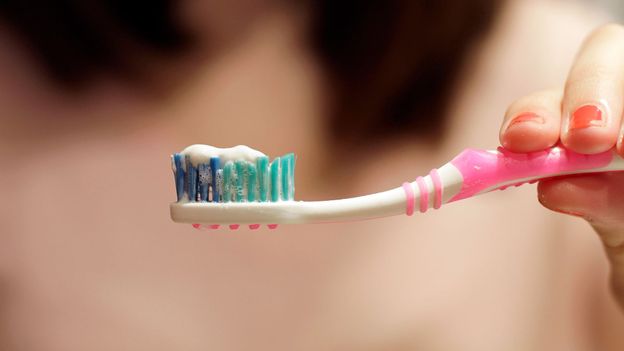歯ブラシの衛生面でのお話。
普通の歯ブラシにはバクテリアがいっぱい巣くっているという。
どのくらいの期間で取り替えるべきだろうか?
歯ブラシには100−1200万ものバクテリアや菌が棲みついていると言われている。
種類は数え切れないほどでウィルスもある。それは歯ブラシのブラシの付け根などにあるのだ。
そして、販売されている歯ブラシの半分からは、最初からバクテリアがついているという。
BBCより、
Your toothbrush is bristling with bacteria – is it time to change it?

Is Your Toothbrush Crawling with Bacteria? Here’s What Science Says
🧭 Meta Description
Your toothbrush may contain millions of bacteria, including viruses and fungi. Learn how often you should replace or clean it to protect your oral health.
🪥 Main Article
Is Your Toothbrush Crawling with Bacteria?
We all trust our toothbrushes to keep our mouths clean—but what if they’re secretly home to millions of bacteria?
According to research, an average toothbrush can harbor between 1 million and 12 million bacteria.
These microorganisms include not only harmless bacteria but also potentially harmful viruses and fungi. Most of them hide deep in the bristle base, where moisture and toothpaste residue create the perfect breeding ground.
Bacteria Before You Even Start Using It
Here’s the shocking part:
Studies suggest that nearly half of new toothbrushes already have bacteria on them before you even open the package.
That’s because toothbrushes are often exposed to moisture and air during manufacturing and packaging, allowing microbes to settle in.
How Often Should You Replace Your Toothbrush?
Dentists recommend replacing your toothbrush every 3 to 4 months—or sooner if the bristles are frayed.
If you’ve recently had a cold, flu, or COVID-19 infection, it’s best to switch to a new one immediately, since viruses can linger on the bristles.
For daily hygiene:
- Rinse your toothbrush thoroughly after each use.
- Store it upright and uncovered to allow it to dry completely.
- Avoid keeping multiple toothbrushes in contact—bacteria can transfer easily.
Can You Sterilize Your Toothbrush?
Yes—but choose the right method.
Boiling water or alcohol can damage the bristles. Instead, you can:
- Soak it in mouthwash for a few minutes, or
- Use UV sanitizers designed specifically for toothbrushes.
Ultraviolet (UV) disinfection has been shown to reduce bacterial load by up to 90%.
Hospitals and nursing homes already use similar UV boxes to keep hygiene tools safe and clean.
Why It Matters
Your toothbrush is your daily defense against plaque, cavities, and gum disease.
Ironically, it can become a source of infection if neglected.
By maintaining good toothbrush hygiene, you’re not just protecting your mouth—you’re supporting your overall immune health.
📰 Reference
BBC Future – “Your toothbrush is bristling with bacteria – is it time to change it?”
https://www.bbc.com/future/article/20251017-why-you-might-want-to-clean-your-toothbrush-more



コメント